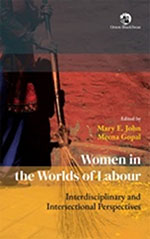Women in the Worlds of Labour, originating in a conference on the same theme in 2014, brings wide-ranging critical and theoretical approaches into conversation with one another. While not claiming to be comprehensive, the editors lay out the analytical and historical importance of an interdisciplinary and intersectional perspective on the subject. In the introduction, they suggest that certain commonsensical views on women’s labour have gained credence due to the lack of in-depth examination of the implications of statistical findings and other crucial factors. The critical value of the qualitative ethnographical approach has also often been forgotten. As growing precarity marks workers’ lives in India, women have organized themselves with far greater energy in recent years against the state and capital nexus, whether it be in Munnar, Bengaluru or New Delhi. ‘Women, they are saying, must be fully recognized for the workers that they are’, write John and Gopal. The introduction stresses the critical importance of building bridges, not simply between different disciplinary perspectives, but also between activist insights and the academic world.
Continue reading this review

